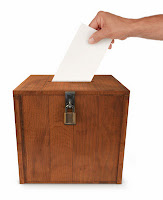
Giving organisational members a say on work-related issues is well understood to heighten a sense of trust, respect and fairness. But a manager who invites opinions may not be planning to consider them. They may want to increase employee engagement through paying lip service to 'dialogue'; they may be an autocrat who feels obliged to appear consistent with the organisation's ethos; they may be reflexively doing something they were told to do at business school. So what happens when the opportunity to express is a case of 'pseudo voice' ... and the employees know it?
Gerdien de Vries, Baren Jehn and Bart Terwel investigated this issue by collecting survey data from 137 workers in a Dutch healthcare institution. Each participant rated the presence of two facets necessary for pseudo voice: did they have opportunity to express their voice? and did they believe their manager would disregard it? When the interaction between these was high, employees tended to give low scores to another measure, the extent to which they took opportunities to voice their opinions. In other words, perceiving deceit led to employees keeping their perspectives on issues to themselves.
The participants also rated the amount of intragroup conflict they experienced. De Vreis and colleagues suspected that when employees withdraw voice because they perceive the opportunity as a sham, conflict may increase: employees respond to this 'organisational illegitimacy' by refusing to play by the rules themselves, or squabble with colleagues in a displaced attempt to reclaim some kind of control. The data duly demonstrated this: participants who perceived pseudo voice experienced more team conflict than those who believed their managers were sincere.
Providing employees with voice is important; as well as its cohesive effects, it provides the organisation with a diversity of perspectives. As its authors note, this study is useful as it "provides a better understanding of the conditions under which offering voice opportunity to employees is likely to backfire" - namely, when they are seen as insincere and deceptive. It's notable that in this study, managers indicated a disregard for voice higher than employees suspected, suggesting if anything the employees were credulous rather than cynical towards management contempt for their opinions. But Machiavellian managers who think an unread suggestion box is a worthwhile gamble should beware; as this study shows, the costs to organisational functioning can be substantial.
(Thanks to reader Chris Woock for bringing this article to the Digest's attention.)


